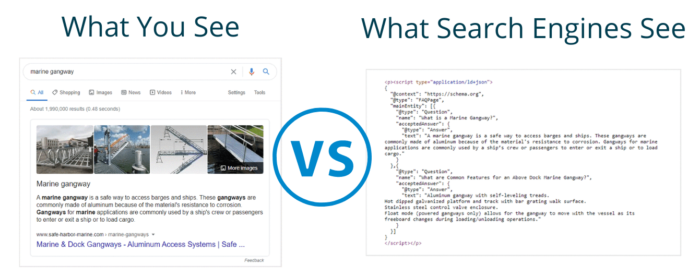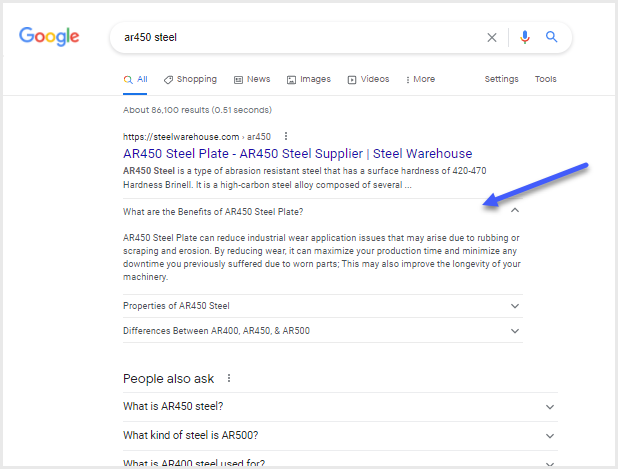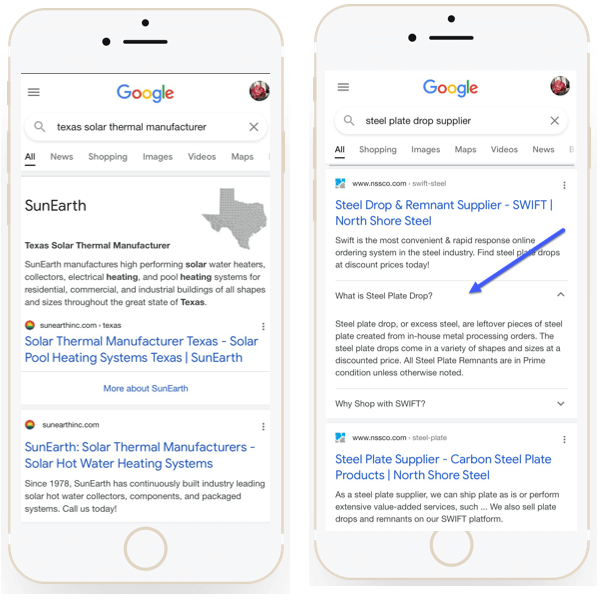February 04 2021
Structured Data 101
Structured data is code written in a specific format used to give search engines a better understanding of the content on your website. It allows you to “talk” to search engines and help them understand the elements that are included on a page of your website.
Using the information in structured data, Google and other search engines are able to create informational, rich results in the search landscape. The results end up looking something like this:

Different Types of Structured Data
There are three formats you can use to structure data:
- JSON-LD
- Microdata
- RDFa
Here at TopSpot, our Search Engine Optimization Team uses the JSON-LD format for structured data. JSON-LD is a Javascript notation embedded in a <script> tag that annotates the data and elements on a page. This format is recommended by Google over microdata and RDFa formats.
Why Use Structured Data?
There are many benefits for adding structured data to your website, such as:
- Increasing your website’s real estate on the search landscape with search engine results page (SERP) features
- Helping search engines get a better understanding of your website’s content
- Gaining prominent rich results in the SERPs to increase your website’s click-thru-rate
- Improving brand presence and search engine understanding of your company
Examples of Commonly Used Structured Data
As you have used search engines to find the answers to your questions, you have seen the results of schema markup appear in the landscape. This includes Frequently Asked Questions (FAQs), videos and images, knowledge panels about a branded search, how-tos, reviews, products, and local business information.
In the example above, the search landscape is showing an FAQ dropdown as a result of including that specific schema used for that page on the client’s website.
What is Schema Markup?
Schema markup is the foundation of structured data. Schema is an HTML language that provides a format for structuring data to be universally recognized by all search engines. It is a type of structured data that can be added to a webpage to increase the likelihood of a website showing up as a rich snippet in the search results.
Read our blog post on the different types of search results produced by schema markup
Benefits of Structured Data for SEO
Using structured data on your website helps increase your website’s visibility in the search landscape by providing the search engines the information needed to occupy one of the search result enhancements or even a featured snippet or knowledge panel. Structured data also allows the search engine to better understand and rank rich media in the search landscape since rich media formats can be difficult for search engines to understand. To occupy a featured snippet or knowledge box, the search engines pull from structured data.
Because you are giving users information about your company up front, when they click through, they are already more invested in doing business with you. This means your clickthrough rate as well as conversion rate are likely to be higher and of better quality.
Benefits of Structured Data on Mobile
Every year more and more users are performing searches on mobile. Because there is limited screen space on mobile devices, showing up in a featured snippet or rich result can have a huge impact on a website’s performance in the search landscape. Adding structured data to your website can increase the likelihood of your website appearing in a featured snippet. These snippets help companies dominate the real estate on the search landscape and stand out on mobile by pushing competitors further down the page.
What Does This Mean For Me?
When looking at the space your website occupies in the search landscape, it’s good to understand the hows and whys behind what you are seeing. Structured data enhances organic listings and can help provide your customers with the data they need so they come to your website more prepared and ready to purchase.



